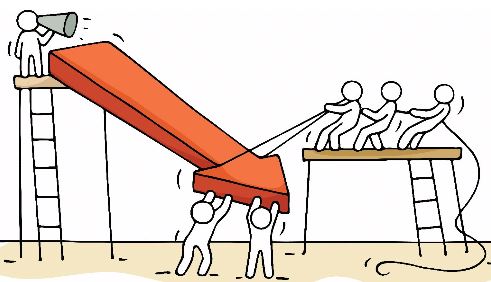There is considerable public debate around the future of the economy once the government-mandated lockdown is over. What will the “new normal” look like? Many commentators have predicted the future course of the economy and the same is a topic for discussion at almost every dinner table in the country. The truth is – no one knows, and since everyone is just speculating, I’ll do the same.
The government will have to fight the battle for economic revival on multiple fronts. Even as it is difficult to gauge the depth of the financial problems the country is facing right now, a few glaring issues come to mind when we think about the economy.
The economic burden caused by the lockdown is evident. Most of the economic activity has halted, and the state governments have lost thousands of crores in revenue. For example, the Delhi government’s revenue fell from ₹3,500 crore in April 2019 to ₹300 crore in April 2020. Some state governments have already started tackling the financial crunch they are facing. Recently, the decision to open liquor shops and the increase in taxes on alcohol by some states was guided by the urgent need to raise revenues. Some governments also claimed that if not allowed to sell alcohol, they would not be able to pay salaries. Some innovation was also observed as the Chhattisgarh government launched a website for home delivery of alcohol to avoid crowding at wine shops.
Another glaring problem after the lockdown would be employment regeneration. Apart from a few fortunate people, millions of others are facing unemployment due to the lockdown. With the government already facing a massive financial crunch, it is doubtful that it could fund any national employment schemes. The Indian job market had been bad even before the pandemic with unemployment reaching the highest point in over four decades. We can assume that a robust job-market is unlikely for years to come.
Since COVID-19 has affected each country differently, it is hard to predict when lockdowns worldwide would end. Even if India opens up its economy, it would be challenging for international trade to resume. As and when lockdowns do open, the “new normal” would ideally have a higher screening process for things entering and leaving the country. The cost of import-export will consequently go up.
There will be other unforeseen challenges, but as I mentioned, this is all speculation. There is no doubt that things are looking bad, but as the old proverb goes – “Necessity is the mother of invention”. As we continue to fight, we also continue to innovate. Going back to our liquor example, home delivery of alcohol was illegal in most states before the pandemic. Now, the government itself is creating the infrastructure for it.
It is expected that we will likely face extensions to the current lockdown. Things are not going back to normal for at least the next few months, in the best-case scenario. The real challenge facing our government is to pivot through the gradual revival of the economy, make smart and informed policy decisions, and above all not to underestimate the plight of the common man, who is bearing the brunt of the lockdown.
Read More: Lockdown’s Lesson on Central Planning – It Doesn’t Work!
Post Disclaimer
The opinions expressed in this essay are those of the authors. They do not purport to reflect the opinions or views of CCS.






